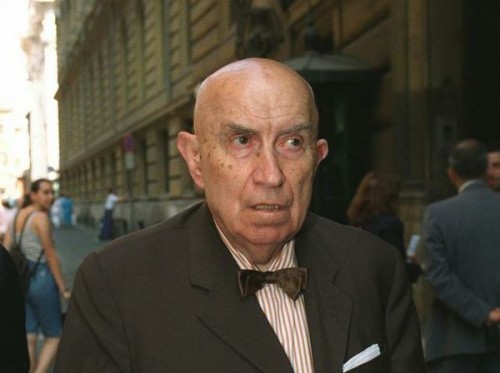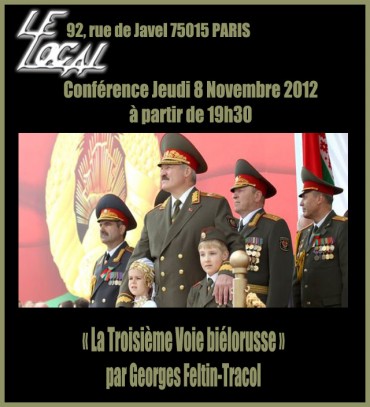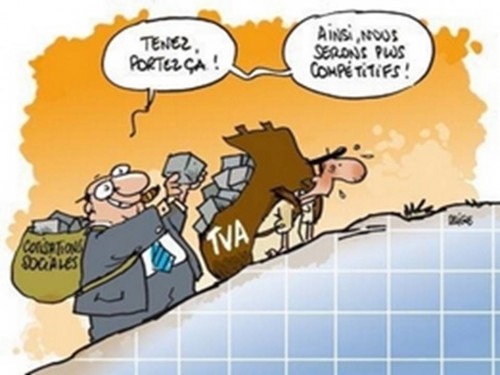
L'Europe ne sera sauvée que par une remise en cause du dogme libre-échangiste!
Ex: http://infonatio.unblog.fr/
Jean-Luc Gréau n’est pas vraiment un agité altermondialiste. Cadre au CNPF, puis au MEDEF pendant trente-cinq ans, c’est un économiste iconoclaste qui nourrit sa réflexion aux meilleures sources : Smith, Schumpeter et Keynes. À la différence de bon nombre de ses pairs, il a vu venir la crise, comme il la voit aujourd’hui se poursuivre. Un économiste avisé. L’espèce est rare.
Le Choc du mois : Quelles sont selon vous les nouveautés radicales qui caractérisent la globalisation économique mise en place dans les années 1980-1990, et dont vous dites qu’elles ont changé la nature même du libéralisme économique ?
Jean-Luc Gréau : Nous percevons maintenant avec netteté les deux orientations cruciales qui ont ouvert la voie à la transformation économique et financière de ces trente dernières années. Une première orientation est donnée par la subordination de l’entreprise aux volontés expresses de ces actionnaires puissants que sont les fonds de placement. La personne morale « entreprise » a été instrumentalisée et abaissée au rang de machine à faire du profit (money maker). Le phénomène est manifeste pour les sociétés cotées qui ne sont pas protégées par un capital familial ou par des actionnaires de référence, mais il affecte aussi beaucoup de sociétés non cotées, contrôlées par des fonds dits de « private equity » qui ont les mêmes exigences que les actionnaires boursiers.
Une deuxième orientation est représentée par le libre-échange mondial qui concerne surtout l’Europe, espace le plus ouvert au monde, et à un moindre degré, les États-Unis. Cette ouverture des marchés des pays riches revêt une importance cruciale du fait que, contrairement au double postulat de suprématie technique et managériale des Occidentaux d’une part, et de spécialisation internationale du travail d’autre part, les pays émergents ont démontré leur capacité à rattraper nos économies et à s’emparer de parts de marché croissantes, y compris dans les secteurs à fort contenu technologique. Sait-on que les États-Unis subissent, depuis 2003, un déficit croissant de leurs échanges dans ces secteurs ?
La grande transformation s’est produite quand ces deux orientations ont conjugué leurs effets pour entraîner les économies développées dans une spirale de déflation rampante des salaires qui a été longtemps masquée par l’endettement des particuliers. C’est cela que signifie au premier chef la crise des marchés du crédit déclenchée en 2007 : l’incapacité pour de nombreux ménages occidentaux de rembourser une dette disproportionnée.
Estimez-vous que nous allons vers une sortie de crise comme le prétendent les chefs d’État du G20 ?
Non, la crise du crédit privé n’est pas résorbée, en dépit de ce qu’affirme la communication tendancieuse de la corporation bancaire: elle couve discrètement dans les comptes de nombreux organismes. Aujourd’hui, nous devons faire face de surcroît à une montée des périls sur la dette publique de la plupart des pays occidentaux, pour ne pas dire tous. L’affaissement des recettes fiscales, le subventionne-ment des banques en faillite et les mesures de relance ont sapé les fondements de l’équilibre des comptes publics. Pour conjurer les nouveaux périls, il faudrait que se manifeste une providentielle reprise économique forte et durable redonnant aux Etats les moyens de faire face à leurs obligations financières. Mais les orientations qui ont conduit au séisme sont toujours à l’œuvre et l’on peut craindre au contraire leur renforcement.
Comment interprétez-vous la crise suscitée par l’explosion de la dette publique grecque ?
La faillite virtuelle de la Grèce, qui devrait précéder de peu celle d’autres pays européens, nous enseigne deux choses. La première est que le choix d’une monnaie unique impliquait le choix corrélatif d’une union douanière. Or, nous avons fait, immédiatement après Maastricht, le choix inverse de l’expérience, en forme d’aventure, du libre-échange mondial et de la localisation opportuniste d’activités et d’emplois dans les sites les moins chers. Ce choix a fragilisé par étapes les économies les moins compétitives, de la périphérie européenne, mais aussi des économies dignes de considération comme la française et l’italienne. Il a en outre conduit l’Allemagne, puissance centrale, à réduire ses coûts du travail, pour se maintenir à flot grâce à un courant d’exportation croissant, mais au prix d’une consommation chronique-ment en berne, qui pèse sur les exportations des partenaires européens vers le marché allemand. L’Europe, s’il n’est pas trop tard, ne sera sauvée que par une remise en cause du dogme libre-échangiste.
La deuxième est probablement que la monnaie unique a joué, à l’inverse de ce qu’imaginaient ses concepteurs, un rôle d’inhibiteur des faiblesses et des déséquilibres. Avant la crise, tous les pays de la zone euro bénéficiaient de conditions d’emprunt favorables. Les écarts de taux entre l’Allemagne et les pays aujourd’hui directement menacés étaient tout à fait négligeables. C’était là la grande réussite apparente de l’euro. Mais ce faisant, et avec l’apport complémentaire des fonds dits de cohésion structurels, les pays membres de la zone euro n’ont, en dehors de l’Allemagne et des Pays-Bas, pas pensé leur modèle économique. Des déficits extérieurs structurels sont apparus partout où l’on n’avait pas les moyens de relever le double défi du libre-échange et de la monnaie forte. Ces déficits structurels n’ont aucune chance de se résorber, sauf dans deux hypothèses : la sortie de l’euro par les pays concernés ou l’entrée en violente dépression de la demande interne. On conviendra que chacune de ces hypothèses renferme la probabilité de la fin de l’Europe, telle que nous l’avons vu vivre depuis les commencements du projet.
Le dollar pourra-t-il rester selon vous l’étalon monétaire universel dans les années qui viennent ?
Il existe un malentendu ancien et majeur au sujet du rôle international du dollar. La devise américaine a cessé de constituer, une fois pour toutes, un étalon pour les autres monnaies, à partir de son flottement décidé au printemps 1973. Depuis lors, il fluctue, comme la plupart des autres monnaies importantes, en suivant de fortes variations dans le temps. Or, une monnaie étalon joue par définition le rôle d’un môle d’amarrage pour les autres monnaies. Au surplus, le rôle du dollar en tant que monnaie étalon ne figure plus dans aucun texte en vigueur. Il demeure prédominant en tant que moyen international de facturation et de règlement des transactions commerciales et financières. Cette prédominance découle de la puissance intrinsèque de l’économie américaine, mais aussi de la facilité d’acheter des biens internationaux comme les matières premières avec une seule monnaie. De surcroît, les partenaires asiatiques des États-Unis s’en sont toujours accommodés dans la mesure où ils étaient d’un côté importateurs de matières premières, et, d’un autre côté, exportateurs vers les États-Unis. L’entrée en scène de l’euro n’a pas modifié cet état de choses, sinon à la marge. Les Airbus sont toujours facturés en dollars, comme les Boeing.
On peut penser cependant que la situation pourrait évoluer du fait du déclin relatif de l’emprise économique et financière des États-Unis. La puissance américaine a trouvé un interlocuteur en la personne de la nouvelle puissance chinoise. C’est entre ces deux pays qu’a commencé, semble-t-il, le régime de partage de la domination, ce qui crée une situation dangereuse pour les autres parties du commerce mondial, mais aussi à terme, pour les États-Unis eux-mêmes, qui ne peuvent escompter autre chose qu’une poursuite de leur déclin relatif. La Chine deviendra maîtresse du jeu, sauf si les Occidentaux font obstacle à son impérialisme économique ou si ce pays devait connaître à son tour une crise due à la surchauffe qui se manifeste depuis quelques mois.
D’après vous, la crise économique que doit affronter le monde depuis trois ans a-t-elle ébranlé la solidité des dogmes libre-échangistes ?
Hélas, à l’instant présent, les dogmes, les tabous et les interdits qui définissent l’expérience néo-libérale restent en place. On se réjouit officiellement de ce que le libre-échange ait survécu malgré la gravité de la crise dont il constitue pourtant une cause majeure. On exhorte maintenant les pays sinistrés ou en difficulté à de nouveaux sacrifices sans prendre en considération le risque de retour en force de la crise de la demande et de rechute consécutive de l’ensemble des marchés financiers. L’aveuglement persiste et s’aggrave, en dehors de petits cercles de personnes placées en prise directe avec les entreprises ou les territoires sinistrés. Une chape de plomb s’est à nouveau refermée sur les consciences sincèrement ouvertes au débat. Mais le déni de réalité ne pourra se prolonger longtemps. Patience !
Propos recueillis par Pierre-Paul Bartoli
LECHOCDUMOIS mai 2010
À lire : Jean-Luc Gréau, La Trahison des économistes, « Le Débat », Gallimard, 250 p., 15,50 €




 del.icio.us
del.icio.us
 Digg
Digg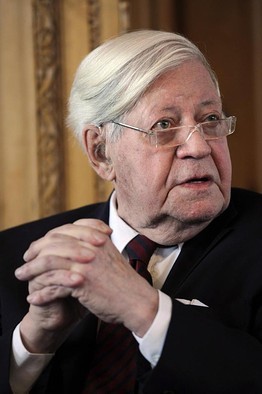 Le mercredi 7 novembre, lors du forum économique de l’hebdomadaire de Hambourg Die Zeit, l’ancien chancelier Helmut Schmidt a déclaré, devant 600 invités de l’économie et de la politique, qu’avec la crise de surendettement en arrière-plan, il n’est pas impensable qu’il y aura de profonds changements politiques et économiques. «Nous nous trouvons à la veille d’une possible révolution en Europe», prévient Schmidt. Il pressent que dans toute l’Europe la confiance dans les institutions européennes a diminué. La situation en Chine et aux Etats-Unis est également caractérisée par des incertitudes.
Le mercredi 7 novembre, lors du forum économique de l’hebdomadaire de Hambourg Die Zeit, l’ancien chancelier Helmut Schmidt a déclaré, devant 600 invités de l’économie et de la politique, qu’avec la crise de surendettement en arrière-plan, il n’est pas impensable qu’il y aura de profonds changements politiques et économiques. «Nous nous trouvons à la veille d’une possible révolution en Europe», prévient Schmidt. Il pressent que dans toute l’Europe la confiance dans les institutions européennes a diminué. La situation en Chine et aux Etats-Unis est également caractérisée par des incertitudes. 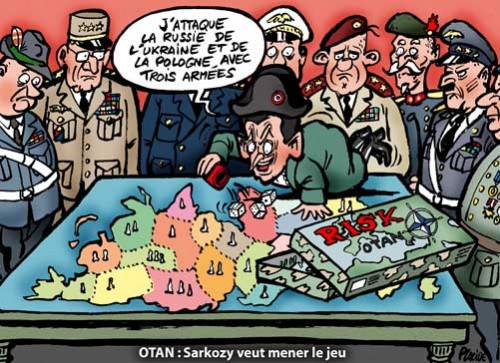
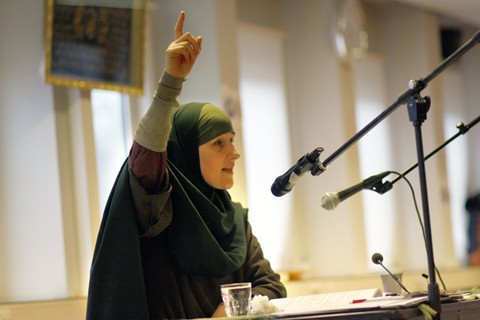

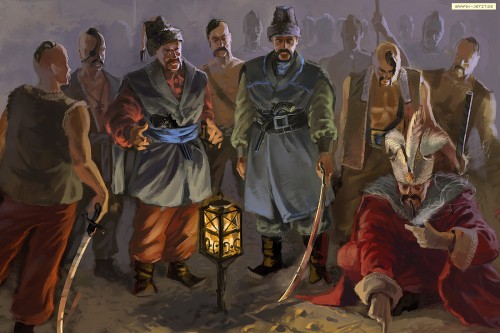
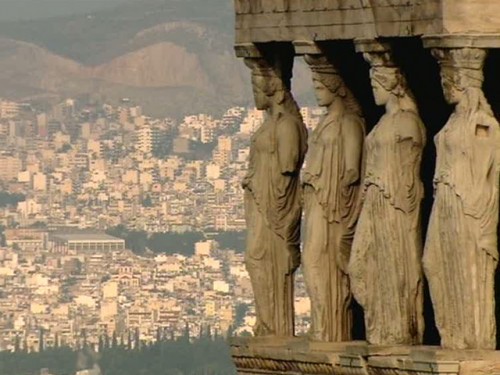

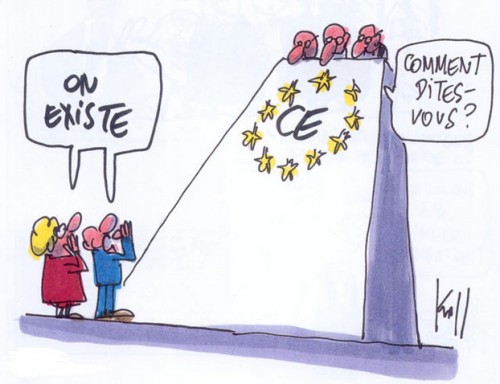
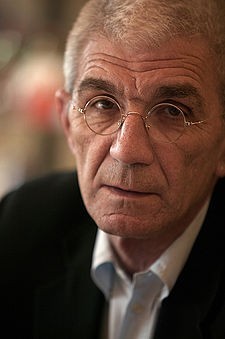
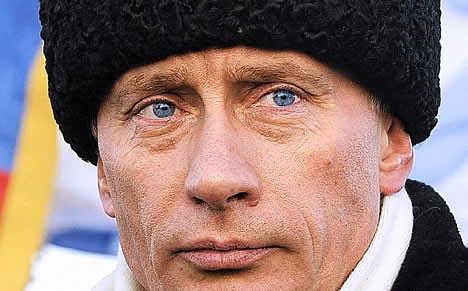

 “Vous avez un peuple et quasiment du jour au lendemain, à l’échelle des peuples, en une génération, vous avez à sa place, sur son territoire, un ou plusieurs autres peuples. Vous avez une culture, une civilisation et en moins de temps qu’il n’en faut à un enfant pour devenir adulte, à un jeune homme pour devenir un homme mûr, se développent sur le même territoire, par substitution, d’autres cultures, d’autres civilisations dont M. Guéant me permettra de dire qu’elles ne valent pas celle qu’elles remplacent, au moins pour prospérer sur ce territoire-là. Poitiers m’en soit témoin, voici que vous avez autour de vous d’autres monuments, d’autres édifices religieux, d’autres visages, d’autre relations entre les hommes et les femmes, d’autres façons de se vêtir, d’autres langues bien souvent et de plus en plus, une autre religion, d’autres nourritures et d’autres rapports à la nourriture, d’autres façons d’habiter la terre et plus encore d’habiter tout court, d’habiter les immeubles, les cages d’escalier, les quartiers, d’autres façons d’administrer l’espace, d’autres rapports à la nature, à l’environnement, à la loi, à la délinquance, à la violence, au contrat social, à la protection sociale, au pacte d’in-nocence, de non-nuisance.
“Vous avez un peuple et quasiment du jour au lendemain, à l’échelle des peuples, en une génération, vous avez à sa place, sur son territoire, un ou plusieurs autres peuples. Vous avez une culture, une civilisation et en moins de temps qu’il n’en faut à un enfant pour devenir adulte, à un jeune homme pour devenir un homme mûr, se développent sur le même territoire, par substitution, d’autres cultures, d’autres civilisations dont M. Guéant me permettra de dire qu’elles ne valent pas celle qu’elles remplacent, au moins pour prospérer sur ce territoire-là. Poitiers m’en soit témoin, voici que vous avez autour de vous d’autres monuments, d’autres édifices religieux, d’autres visages, d’autre relations entre les hommes et les femmes, d’autres façons de se vêtir, d’autres langues bien souvent et de plus en plus, une autre religion, d’autres nourritures et d’autres rapports à la nourriture, d’autres façons d’habiter la terre et plus encore d’habiter tout court, d’habiter les immeubles, les cages d’escalier, les quartiers, d’autres façons d’administrer l’espace, d’autres rapports à la nature, à l’environnement, à la loi, à la délinquance, à la violence, au contrat social, à la protection sociale, au pacte d’in-nocence, de non-nuisance. 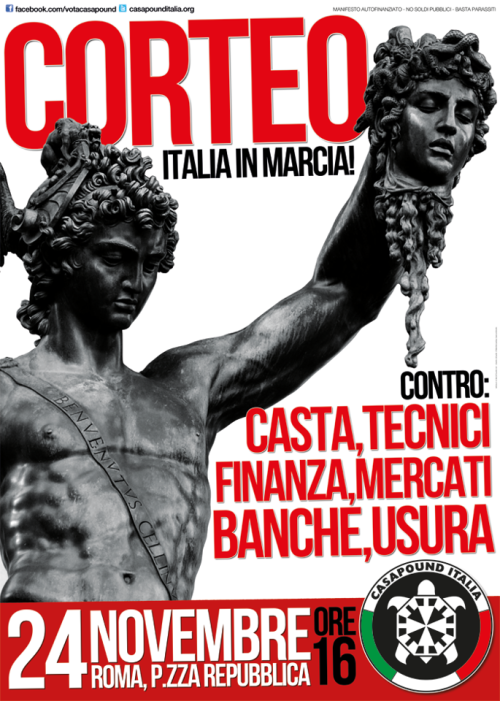
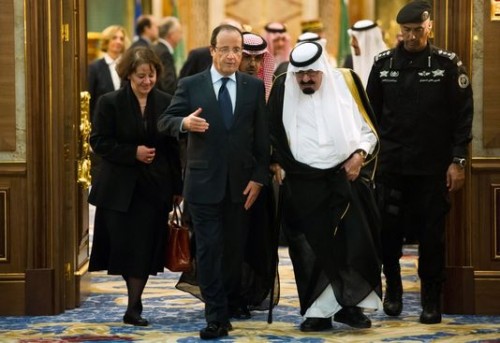

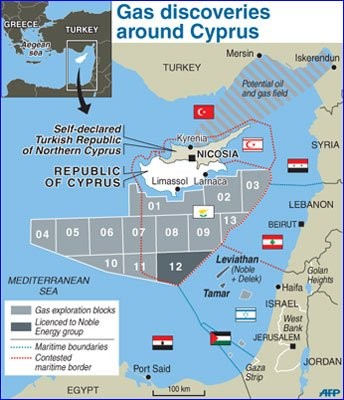 La Turquie réclame que l’Europe fasse un pas décisif et prenne des décisions immédiates pour faire accéder définitivement la Turquie à l’UE mais, simultanément, elle menace une importante société pétrolière européenne, l’ENI italienne, parce que celle-ci s’apprête à signer des accords avec Chypre pour exploiter les gisements de gaz au large de l’île. Pour le gouvernement d’Ankara, les mesures visant à favoriser le plus rapidement possible l’entrée de la Turquie dans l’UE devraient être prises au terme de l’actuelle présidence cypriote. De plus, la Turquie compte entrer dans le club des Vingt-Sept d’ici 2023. Ce langage fort a été tenu par le premier ministre turc Recep Tayyip Erdogan, flanqué de son ministre des affaires européennes, Egemen Bagis, dans les colonnes du quotidien turc “Hurriyet”: “A la fin de la présidence cypriote, nous attendons une avancée décisive de la part de l’UE. L’UE a actuellement une attitude contraire à ses propres intérêts. Elle doit se ‘repenser’ et accélérer le processus d’adhésion de la Turquie”, a conclu le ministre. “Nous avons dit qu’avant 2023, la Turquie devrait être un membre à part entière de l’UE”, a ajouté Bagis dans ses réponses au journaliste de “Hurriyet”, mais nous n’avons pas l’intention d’attendre jusqu’à la fin de l’année 2023”.
La Turquie réclame que l’Europe fasse un pas décisif et prenne des décisions immédiates pour faire accéder définitivement la Turquie à l’UE mais, simultanément, elle menace une importante société pétrolière européenne, l’ENI italienne, parce que celle-ci s’apprête à signer des accords avec Chypre pour exploiter les gisements de gaz au large de l’île. Pour le gouvernement d’Ankara, les mesures visant à favoriser le plus rapidement possible l’entrée de la Turquie dans l’UE devraient être prises au terme de l’actuelle présidence cypriote. De plus, la Turquie compte entrer dans le club des Vingt-Sept d’ici 2023. Ce langage fort a été tenu par le premier ministre turc Recep Tayyip Erdogan, flanqué de son ministre des affaires européennes, Egemen Bagis, dans les colonnes du quotidien turc “Hurriyet”: “A la fin de la présidence cypriote, nous attendons une avancée décisive de la part de l’UE. L’UE a actuellement une attitude contraire à ses propres intérêts. Elle doit se ‘repenser’ et accélérer le processus d’adhésion de la Turquie”, a conclu le ministre. “Nous avons dit qu’avant 2023, la Turquie devrait être un membre à part entière de l’UE”, a ajouté Bagis dans ses réponses au journaliste de “Hurriyet”, mais nous n’avons pas l’intention d’attendre jusqu’à la fin de l’année 2023”. 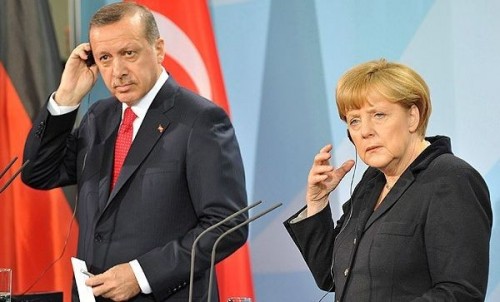


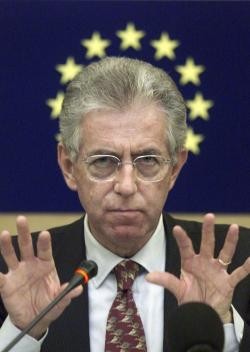 En novembre 2011, la démocratie italienne recevait un grand coup de pied aux fesses. Le technicien Mario Monti fut imposé, nommé, chargé de gouverner le pays… sans que le vote populaire soit sollicité : le scandale est évité par la bénédiction d’une classe politique ignarde et corrompue (et… inutile face à la crise), et grâce aux éloges des médias obéissants prétextant que les techniciens sont des gens sacrément intelligents.
En novembre 2011, la démocratie italienne recevait un grand coup de pied aux fesses. Le technicien Mario Monti fut imposé, nommé, chargé de gouverner le pays… sans que le vote populaire soit sollicité : le scandale est évité par la bénédiction d’une classe politique ignarde et corrompue (et… inutile face à la crise), et grâce aux éloges des médias obéissants prétextant que les techniciens sont des gens sacrément intelligents.
